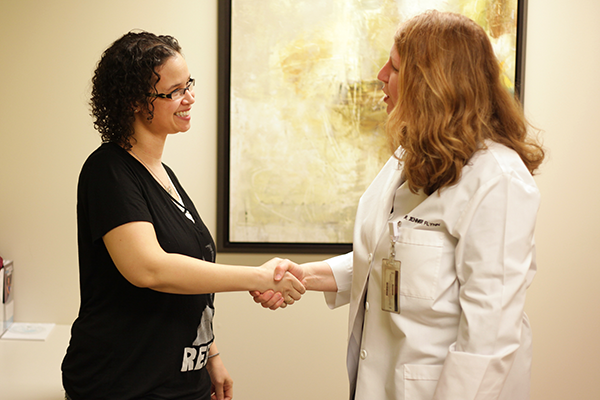As you get a bit older, you get used to certain screening exams. There are colonoscopies, mammograms and pap smears, but another test that your women’s care provider will often recommend around the age of 65 is a bone density test.
As the name implies, this is a screening test that examines the density of your bones to ensure you aren’t at risk for certain health conditions. In today’s blog, we take a closer look at the bone density test and explain why we oftentimes recommend them to patients.
How Is A Bone Density Test Performed?
A bone density exam can be performed in a few different ways, but the most common procedure is known as a dual energy x-ray absorptiometry. It is the standard because it is fast, accurate and involves a minimal amount of radiation. During the procedure, you will be asked to lay on a table while a scanner is moved over certain areas of your body, like your hips, spine and wrists.
The scan will measure your bone mineral density, and this reading is compared to the bone mineral density of a young healthy woman between the age of 25 and 35. How much your score deviates from the standard score allows your doctor to determine what is known as your “T score.” This T score can be either positive or negative, and it helps to determine your risk for certain bone density issues. For example:
-
A T score of +1 to -1 standard deviation is considered greater than normal and healthy.
-
A T score of -1 to -2.4 standard deviation is considered osteopenia, which means that you have low bone mass and may be at a greater risk for eventual osteoporosis.
-
A T score of -2.5 or less would suggest that the individual has osteoporosis.
If you have a healthy T score, your doctor will likely tell you to continue following your diet and exercise habits, as you have a healthy bone mineral density. If you have low bone mass, your doctor will talk with you about how you can improve your diet and exercise habits to help improve your bone mineral density or prevent further bone loss. They may also discuss adding vitamin supplements to your daily routine. If you are diagnosed with osteoporosis, your doctor will talk about what you can do to improve your bone density and what you need to be aware of since you’ll have an increased fracture risk. Balance training and physical therapy may be recommended to help reduce your fracture risk alongside other lifestyle adjustments.
These bone density scans are very important for women around the age of 65 because they are the group at greatest risk for bone density loss and problems associated with weakening bones. Your fracture risk increases significantly based on your standard deviation from the norm, so it’s important to understand your risk and make simple adjustments so that a fracture doesn’t slow you down. Bone density tests are one of the screenings we recommend to women at the age of 65, and we’ll be more than happy to refer you to a great provider who can conduct the quick and easy exam.
Don’t live with a heightened risk for fractures because you weren’t aware that you were dealing with bone density loss. Get a quick and comprehensive scan and move forward with a plan to improve your bone density and reduce your fracture risk. For more information, or for answers to questions about different women’s health issues, reach out to the team at MetroPartners OBGYN today at (651) 770-3320.

